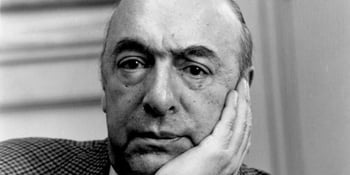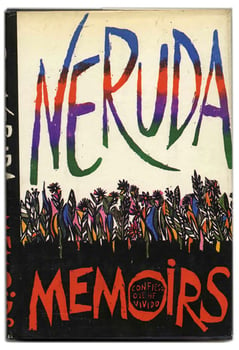Pablo Neruda wasn’t born with the name by which so many readers across the globe have come to know his work. Rather, he was born Neftalí Ricardo Reyes Basoalto in the small Chilean town of Parral, Chile. This December marks the 45th anniversary of Neruda winning the Nobel Prize in Literature. In 1971, Neruda traveled back to Stockholm—he had visited on previous occasions and had met the founder of Sweden’s first poetry journal, FIB:S lyrikklub, Stig Carlson—to accept the Nobel Prize. Yet his winning this award wasn’t entirely a surprise. To be sure, scholars and fans of his work had been making efforts for years to encourage the Nobel Committee to recognize the poet’s achievements. On this anniversary of Neruda winning the Nobel Prize, we’d like to think a bit more about why Neruda was selected for the award, as well as some of the reasons that the Nobel Committee didn’t honor him earlier in his lifetime.
Nobel Committee Awards Prize for Political Poetry
 In many ways, the Committee’s decision to award the Nobel Prize in Literature to Pablo Neruda was based on the poet’s political import. Following the publication of Canto General in 1950 in Mexico City, Neruda became widely known not only in the Americas, but also throughout Europe and Asia. Certain of the cantos from the book were translated into dozens of different languages and marketed as pieces of anti-colonial literature. Most notably, “The Heights of Macchu Picchu,” canto XII, depicts the rise and fall of the Inca civilization and the social, cultural, and political harms linked to imperialism.
In many ways, the Committee’s decision to award the Nobel Prize in Literature to Pablo Neruda was based on the poet’s political import. Following the publication of Canto General in 1950 in Mexico City, Neruda became widely known not only in the Americas, but also throughout Europe and Asia. Certain of the cantos from the book were translated into dozens of different languages and marketed as pieces of anti-colonial literature. Most notably, “The Heights of Macchu Picchu,” canto XII, depicts the rise and fall of the Inca civilization and the social, cultural, and political harms linked to imperialism.
The power of Canto General reaches beyond Peru, however, and explores the vast history of South America, a history often marred by violence and corruption while still retaining its earthly beauty. In describing the motivation for awarding Neruda the Nobel Prize in Literature, the Committee indicated that the honor was “for a poetry that with the action of an elemental force brings alive a continent’s destiny and dreams.” In his Nobel Lecture, Neruda alluded to the vastness of Chile and its sublime landscape, while also invoking similarities among disparate regions of the globe:
“My speech is going to be a long journey, a trip that I have taken through regions that are distant and antipodean, but not for that reason any less similar to the landscape and the solitude in Scandinavia. I refer to the way in which my country stretches down to the extreme South. So remote are we Chileans that our boundaries almost touch the South Pole, recalling the geography of Sweden, whose head reaches the snowy northern region of this planet. Down there on those vast expanses in my native country . . . I was compelled to cross . . . the Andes to find the frontier of my country with Argentina. Great forests make these inaccessible areas like a tunnel through which our journey was secret and forbidden, with only the faintest signs to show us the way.”
Complicating Neruda as Nobel Laureate
 As we mentioned previously, there were numerous efforts from the early 1960s onward to make Neruda recognizable as a contender for the Nobel Prize. Most notably, perhaps, the central library of the University of Chile put together a bilingual bibliographical catalogue of Neruda’s works with “Stockholm, 1966” printed firmly on the cover. The title of the catalogue was printed first in Swedish, Bibliografisk översikt över Pablo Neruda. Its contents provided information about a bibliographic exhibition of the poet’s works in Santiago, Chile, featuring 100 Neruda collections in Spanish and translations of Neruda’s poetry from 19 different countries. Some scholars believe that this catalogue was an overt effort to gain recognition from the Nobel Committee. It’s possible that the exhibition did in fact help to bring about greater interest in Neruda’s works, but we can’t know with certainty.
As we mentioned previously, there were numerous efforts from the early 1960s onward to make Neruda recognizable as a contender for the Nobel Prize. Most notably, perhaps, the central library of the University of Chile put together a bilingual bibliographical catalogue of Neruda’s works with “Stockholm, 1966” printed firmly on the cover. The title of the catalogue was printed first in Swedish, Bibliografisk översikt över Pablo Neruda. Its contents provided information about a bibliographic exhibition of the poet’s works in Santiago, Chile, featuring 100 Neruda collections in Spanish and translations of Neruda’s poetry from 19 different countries. Some scholars believe that this catalogue was an overt effort to gain recognition from the Nobel Committee. It’s possible that the exhibition did in fact help to bring about greater interest in Neruda’s works, but we can’t know with certainty.
Why didn’t the Nobel Committee honor Neruda earlier? Many believe that Neruda’s deep connections to Joseph Stalin—which the poet would gradually move away from in his later life—limited his appeal in Stockholm. In 1953, Neruda was awarded the Stalin Peace Prize, and he maintained support for Stalin despite evidence of severe repression and politically charged killings in the Soviet Union.
Now, 45 years after Neruda accepted the Nobel Prize in Literature, we can reflect on both the power of his poetry and his limitations as an individual in a broader global sphere. Yet what we’d really like to do is emphasize the presence of his books as physical objects throughout the world, and to encourage you to see Neruda’s works as a jumping-off point for exploring the connections between politics and fiction that you see in the twenty-first century.









